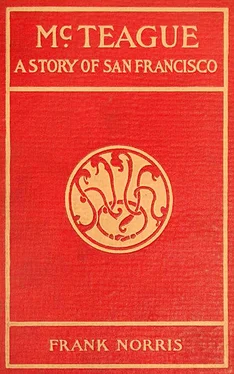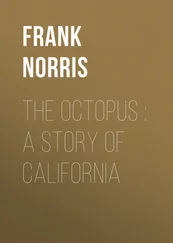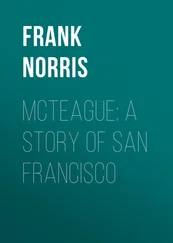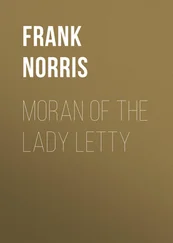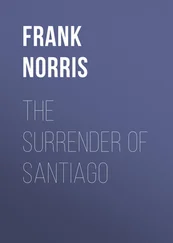Frank Norris - McTEAGUEA Story of San Franciscoby
Здесь есть возможность читать онлайн «Frank Norris - McTEAGUEA Story of San Franciscoby» весь текст электронной книги совершенно бесплатно (целиком полную версию без сокращений). В некоторых случаях можно слушать аудио, скачать через торрент в формате fb2 и присутствует краткое содержание. Год выпуска: 1899, Жанр: Классическая проза, на английском языке. Описание произведения, (предисловие) а так же отзывы посетителей доступны на портале библиотеки ЛибКат.
- Название:McTEAGUEA Story of San Franciscoby
- Автор:
- Жанр:
- Год:1899
- ISBN:нет данных
- Рейтинг книги:5 / 5. Голосов: 1
-
Избранное:Добавить в избранное
- Отзывы:
-
Ваша оценка:
- 100
- 1
- 2
- 3
- 4
- 5
McTEAGUEA Story of San Franciscoby: краткое содержание, описание и аннотация
Предлагаем к чтению аннотацию, описание, краткое содержание или предисловие (зависит от того, что написал сам автор книги «McTEAGUEA Story of San Franciscoby»). Если вы не нашли необходимую информацию о книге — напишите в комментариях, мы постараемся отыскать её.
McTEAGUEA Story of San Franciscoby — читать онлайн бесплатно полную книгу (весь текст) целиком
Ниже представлен текст книги, разбитый по страницам. Система сохранения места последней прочитанной страницы, позволяет с удобством читать онлайн бесплатно книгу «McTEAGUEA Story of San Franciscoby», без необходимости каждый раз заново искать на чём Вы остановились. Поставьте закладку, и сможете в любой момент перейти на страницу, на которой закончили чтение.
Интервал:
Закладка:
The doctor and Miss Baker returned to the room and entered, closing the door. The big doctor stood for a moment looking down at Trina rolling her head from side to side upon the pillow, her face scarlet, her enormous mane of hair spread out on either side of her. The little dressmaker remained at his elbow, looking from him to Trina.
"Poor little woman!" said the doctor; "poor little woman!"
Miss Baker pointed to the trunk, whispering:
"See, there's where she kept her savings. See, he broke the lock."
"Well, Mrs. McTeague," said the doctor, sitting down by the bed, and taking Trina's wrist, "a little fever, eh?"
Trina opened her eyes and looked at him, and then at Miss Baker. She did not seem in the least surprised at the unfamiliar faces. She appeared to consider it all as a matter of course.
"Yes," she said, with a long, tremulous breath, "I have a fever, and my head — my head aches and aches."
The doctor prescribed rest and mild opiates. Then his eye fell upon the fingers of Trina's right hand. He looked at them sharply. A deep red glow, unmistakable to a physician's eyes, was upon some of them, extending from the finger tips up to the second knuckle.
"Hello," he exclaimed, "what's the matter here?" In fact something was very wrong indeed. For days Trina had noticed it. The fingers of her right hand had swollen as never before, aching and discolored. Cruelly lacerated by McTeague's brutality as they were, she had nevertheless gone on about her work on the Noah's ark animals, constantly in contact with the "non-poisonous" paint. She told as much to the doctor in answer to his questions. He shook his head with an exclamation.
"Why, this is blood-poisoning, you know," he told her; "the worst kind. You'll have to have those fingers amputated, beyond a doubt, or lose the entire hand — or even worse."
"And my work!" exclaimed Trina.
CHAPTER 19
One can hold a scrubbing-brush with two good fingers and the stumps of two others even if both joints of the thumb are gone, but it takes considerable practice to get used to it.
Trina became a scrub-woman. She had taken council of Selina, and through her had obtained the position of caretaker in a little memorial kindergarten over on Pacific Street. Like Polk Street, it was an accommodation street, but running through a much poorer and more sordid quarter. Trina had a little room over the kindergarten schoolroom. It was not an unpleasant room. It looked out upon a sunny little court floored with boards and used as the children's playground. Two great cherry trees grew here, the leaves almost brushing against the window of Trina's room and filtering the sunlight so that it fell in round golden spots upon the floor of the room. "Like gold pieces," Trina said to herself.
Trina's work consisted in taking care of the kindergarten rooms, scrubbing the floors, washing the windows, dusting and airing, and carrying out the ashes. Besides this she earned some five dollars a month by washing down the front steps of some big flats on Washington Street, and by cleaning out vacant houses after the tenants had left. She saw no one. Nobody knew her. She went about her work from dawn to dark, and often entire days passed when she did not hear the sound of her own voice. She was alone, a solitary, abandoned woman, lost in the lowest eddies of the great city's tide — the tide that always ebbs.
When Trina had been discharged from the hospital after the operation on her fingers, she found herself alone in the world, alone with her five thousand dollars. The interest of this would support her, and yet allow her to save a little.
But for a time Trina had thought of giving up the fight altogether and of joining her family in the southern part of the State. But even while she hesitated about this she received a long letter from her mother, an answer to one she herself had written just before the amputation of her right-hand fingers — the last letter she would ever be able to write. Mrs. Sieppe's letter was one long lamentation; she had her own misfortunes to bewail as well as those of her daughter. The carpet-cleaning and upholstery business had failed. Mr. Sieppe and Owgooste had left for New Zealand with a colonization company, whither Mrs. Sieppe and the twins were to follow them as soon as the colony established itself. So far from helping Trina in her ill fortune, it was she, her mother, who might some day in the near future be obliged to turn to Trina for aid. So Trina had given up the idea of any help from her family. For that matter she needed none. She still had her five thousand, and Uncle Oelbermann paid her the interest with a machine-like regularity. Now that McTeague had left her, there was one less mouth to feed; and with this saving, together with the little she could earn as scrub-woman, Trina could almost manage to make good the amount she lost by being obliged to cease work upon the Noah's ark animals.
Little by little her sorrow over the loss of her precious savings overcame the grief of McTeague's desertion of her. Her avarice had grown to be her one dominant passion; her love of money for the money's sake brooded in her heart, driving out by degrees every other natural affection. She grew thin and meagre; her flesh clove tight to her small skeleton; her small pale mouth and little uplifted chin grew to have a certain feline eagerness of expression; her long, narrow eyes glistened continually, as if they caught and held the glint of metal. One day as she sat in her room, the empty brass match-box and the limp chamois bag in her hands, she suddenly exclaimed:
"I could have forgiven him if he had only gone away and left me my money. I could have — yes, I could have forgiven him even THIS" — she looked at the stumps of her fingers. "But now," her teeth closed tight and her eyes flashed,
"now — I'll — never — forgive — him — as-long — as — I — live."
The empty bag and the hollow, light match-box troubled her. Day after day she took them from her trunk and wept over them as other women weep over a dead baby's shoe. Her four hundred dollars were gone, were gone, were gone. She would never see them again. She could plainly see her husband spending her savings by handfuls; squandering her beautiful gold pieces that she had been at such pains to polish with soap and ashes. The thought filled her with an unspeakable anguish. She would wake at night from a dream of McTeague revelling down her money, and ask of the darkness, "How much did he spend to-day? How many of the gold pieces are left? Has he broken either of the two twenty-dollar pieces yet? What did he spend it for?"
The instant she was out of the hospital Trina had begun to save again, but now it was with an eagerness that amounted at times to a veritable frenzy. She even denied herself lights and fuel in order to put by a quarter or so, grudging every penny she was obliged to spend. She did her own washing and cooking. Finally she sold her wedding dress, that had hitherto lain in the bottom of her trunk.
The day she moved from Zerkow's old house, she came suddenly upon the dentist's concertina under a heap of old clothes in the closet. Within twenty minutes she had sold it to the dealer in second-hand furniture, returning to her room with seven dollars in her pocket, happy for the first time since McTeague had left her.
But for all that the match-box and the bag refused to fill up; after three weeks of the most rigid economy they contained but eighteen dollars and some small change. What was that compared with four hundred? Trina told herself that she must have her money in hand. She longed to see again the heap of it upon her work-table, where she could plunge her hands into it, her face into it, feeling the cool, smooth metal upon her cheeks. At such moments she would see in her imagination her wonderful five thousand dollars piled in columns, shining and gleaming somewhere at the bottom of Uncle Oelbermann's vault. She would look at the paper that Uncle Oelbermann had given her, and tell herself that it represented five thousand dollars. But in the end this ceased to satisfy her, she must have the money itself. She must have her four hundred dollars back again, there in her trunk, in her bag and her match-box, where she could touch it and see it whenever she desired.
Читать дальшеИнтервал:
Закладка:
Похожие книги на «McTEAGUEA Story of San Franciscoby»
Представляем Вашему вниманию похожие книги на «McTEAGUEA Story of San Franciscoby» списком для выбора. Мы отобрали схожую по названию и смыслу литературу в надежде предоставить читателям больше вариантов отыскать новые, интересные, ещё непрочитанные произведения.
Обсуждение, отзывы о книге «McTEAGUEA Story of San Franciscoby» и просто собственные мнения читателей. Оставьте ваши комментарии, напишите, что Вы думаете о произведении, его смысле или главных героях. Укажите что конкретно понравилось, а что нет, и почему Вы так считаете.
